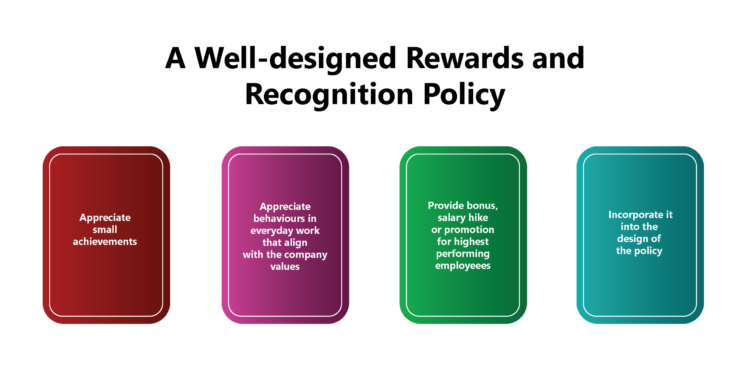1. The “Winner-takes-all” approach may demotivate others: Rewarding only the highest performers with maximum recognition, promotions, or salary increments can demotivate average performers or those on the borderline.
2. Avoiding quota-based or compensatory rewards: However, using a quota system or compensating employees with rewards instead of meaningful recognition or promotions undermines the credibility of the rewards program.
3. Recognize smaller, meaningful achievements: A better approach is to design rewards and recognition policies that appreciate everyday achievements and behaviors aligned with company values, even if they do not directly align with significant performance metrics.
4. Fairness in recognition: Employees who genuinely deserve recognition should receive it. However, it should not be redundant or rewarded in multiple forms for the same achievement, as that would be unfair.
Typically, in any organization, the employees most likely to receive the highest recognition are the highest-performing ones. It is not surprising that they are the ones who receive the highest salary increments and promotions.

Hence, we need to determine whether the winner-takes-all phenomenon is fair.
It seems logical that the highest-performing employees would get the maximum recognition and rewards.
The caveat is that it might demotivate other employees who are average performers or borderline cases.

The bigger sin by managers or even entire organizations is to use a kind of quota system to ‘allocate’ rewards and recognition to employees.
Also, an average performer might end up receiving a reward to ‘compensate’ for the lack of a significant salary increase or promotion!
Or vice-versa! Now, this is a cardinal sin! It makes the whole practice of rewards and recognition a total sham!

A more effective approach would be to design rewards and recognition policies that appreciate small achievements and behaviors in everyday work.
These wouldalign with the company values such as customer orientation, innovation, integrity, or initiative – anything small yet significant.

They may or may not be directly linked to the KRAs and, hence, are unlikely to lead to other forms of ‘rewards’ such as a bonus, salary hike, or promotion.
Hence, organizations need to incorporate this into the policy design.


It refers to recognizing only top-performing individuals—such as giving promotions, bonuses, or awards—while neglecting the contributions of average or borderline performers.
It can demotivate those not ranked at the very top, making average performers feel undervalued or overlooked, which can hurt morale and engagement.
No. Using quotas or giving rewards as compensation (instead of recognizing actual merit) can undermine trust and credibility in the recognition program.
Recognize smaller, everyday achievements—like initiative, teamwork, customer orientation, or innovation—even if they don’t link to key performance metrics. These align more broadly with company values.
It acknowledges the effort and impact of more employees, creating an inclusive recognition culture. It boosts morale, reinforces values, and avoids the pitfalls of exclusivity.
Yes. Celebrating the same achievement multiple times—through different channels or rewards—can appear skewed and may diminish the perceived value of recognition.
A balanced strategy may include:
– Acknowledging big wins and high performance
– Celebrating more minor, behavior-driven accomplishments aligned with values
– Establishing consistent, transparent criteria to ensure fairness
Recognizing values such as integrity, innovation, and initiative helps cultivate the desired organizational culture, motivates broader participation, and keeps employees engaged.
Yes. A more inclusive recognition approach can foster collaboration, boost engagement, and reduce workplace tension by making more team members feel valued and visible.
To be genuinely effective and fair, recognition should go beyond just spotlighting top performers—it should also celebrate everyday excellence that reflects organizational values. This inclusive approach strengthens program credibility and employee connection.
Those employees who deserve recognition should get recognized in any case; however, the employee should not be ‘rewarded’ or ‘recognized’ for the same achievement or behavior in multiple forms. That is not fair!

Lead author: Sagar Chaudhuri, the Co-Founder and CEO of HiFives. He is an HR Tech Evangelist with over 25 years of experience in both corporate and entrepreneurial settings. Previously, Sagar has held leadership roles with companies such as Genpact, Infosys, and ICICI Bank. He has an engineering degree from IIT Kharagpur and an MBA from IIM Lucknow. Connect on LinkedIn
To stay updated on the latest HiFives blogs, follow us on Twitter (@MyHiFives)